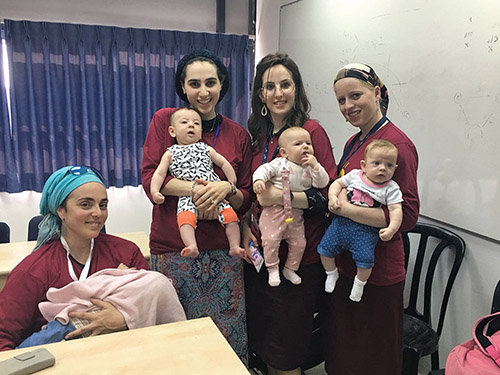

(Courtesy of Jerusalem College of Technology) Nursing mothers holding their babies while first-year college students stay up all night learning how to code, and ultimately developing a web-based math learning program for children—these surreal scenes and others were part of the Jerusalem College of Technology (JCT) Lev Academic Center’s first hackathon for women last week.
Students from JCT’s engineering, business and accounting departments joined forces to create 19 products designed to provide solutions to challenges presented by children’s hospitals, tech firms, retail and commercial sites, organizations working with people with disabilities and more. The challenges were posed by leading technology companies such as Intel, IBM and Rafael Advanced Defense Systems, as well as socially minded start-ups and non-profits.
JCT initially expected 40-60 women to sign up for the hackathon, but registration needed to be closed a day early after surpassing 100. The hackathon’s three winning products were:
JCT is a leader in empowering women, and particularly religious women, by training them at the highest level in engineering, accounting, business and health sciences. JCT educates close to 20 percent of Israel’s female students in computer science and software engineering. Fifty-three percent of JCT’s computer science students are women—18 percent higher than any other Israeli university.
Yet nationwide, religious women remain underrepresented in Israel’s high-tech entrepreneurship ecosystem, underscoring the need for JCT’s hackathon for women where they can get a taste of what it’s like to build a tech product from scratch in a very short time. Religious women in Israel tend to work in programming positions where they utilize their skills, but do not normally have product development or leadership roles, and generally do not believe they can create their own products or start-ups. As a result, Israel’s high-tech arena is missing out on their potentially game-changing ideas.
“Women have significant creative thinking ability and so much to bring to the table in the high-tech world,” said one of the hackathon’s judges, Doron Ish Shalom, director of program development at JVP Play. “What I saw at JCT’s hackathon is inspiring and awesome. Creativity was on display at a very high level. The cooperation between the teams was inspiring. There was very much to learn not from the event itself, but also from the technological solutions that were produced in such a short amount of time.”
The hackathon was part of the new JCT LevTech Entrepreneurship Program, which was launched in October 2017 to provide the college’s students with the tools and opportunities to innovate. The Entrepreneurship Program’s pre-accelerator program, LevTech LAB, offers access to both business and technology mentoring. Yet in line with global trends, the number of women applying to the Entrepreneurship Program in its first year was less than half the number of male applicants.
“Our goal in having a women’s hackathon was to provide an opportunity for the students to work on products in interdisciplinary teams over a short time period—44 hours—and to show them that they really do have what it takes to be high-tech entrepreneurs,” said Orlee Guttman, JCT’s director of strategic partnerships.
Building off the success of the women’s hackathon, JCT now plans to see how it can work with like-minded companies and organizations to boost the LevTech LAB pre-accelerator program for male and female students alike with added infrastructure support, mentoring, guest speakers and more. The top six teams from the women’s hackathon will soon present their innovations to potential partners of the pre-accelerator program.
“The students participating in the hackathon rose up to the companies’ most ambitious challenges” said Eti Stern, head of JCT’s Tal Campus for women, which hosted the hackathon. “This event provided our students with the tools to tackle real challenges in constantly evolving markets, and to cultivate their exceptional capabilities.”













